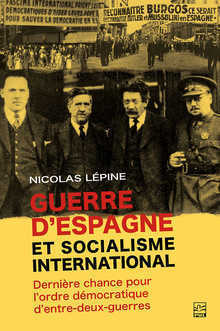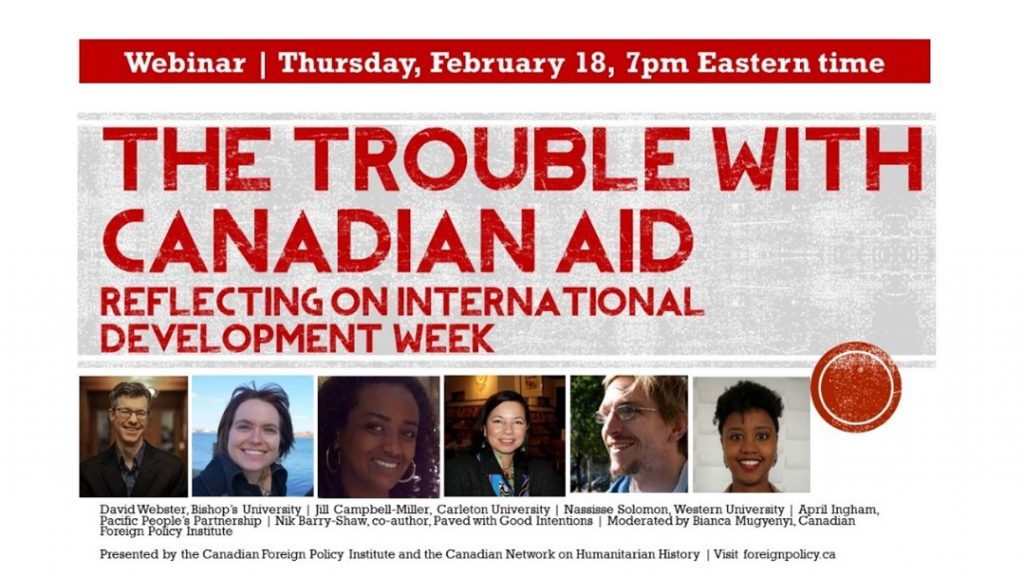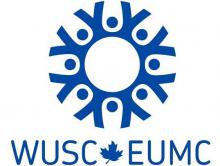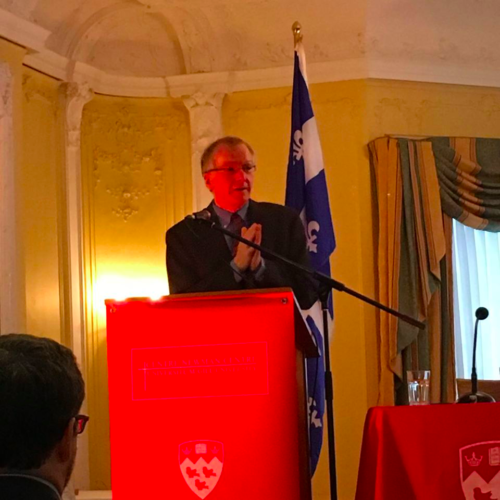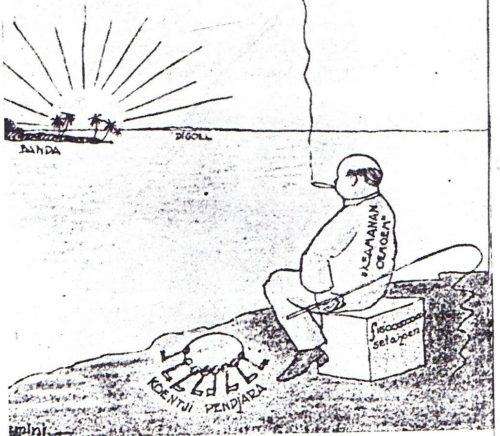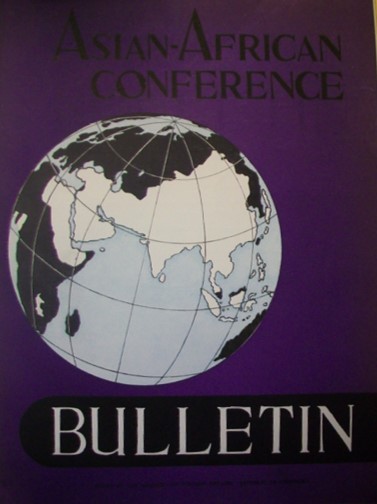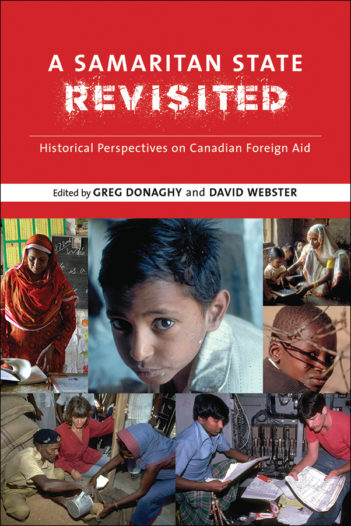In November 2020, two books on the Spanish Civil War, Guerre d’Espagne et socialisme international: Dernière chance pour l’ordre démocratique d’entre-deux-guerres by Nicolas Lépine, and Not for King or Country: Edward Cecil-Smith, the Communist Party of Canada, and the Spanish Civil War by Tyler Wentzell, were launched as part of the Ottawa Historical Association’s first virtual book event. This event was organized with the help of Dr. Dominique Marshall of the CNHH and was co-hosted by Dr. Marshall and, historian and war journalist, Michael Petrou.
Page 7 of 23
Held in mid-February 2021, this webinar was sponsored by the CNHH featuring five academics coming together from different aspects of Canadian foreign policy and aid relations: David Webster (Bishop’s University), Jill Campbell-Miller (Carleton University), Nassisse Solomon (Western University), April Ingham (Pacific People’s Partnership), Dru Oja Jay (co-author Paved with Good Intentions), and moderated by Bianca Mugyenyi (Canadian Foreign Policy Institute).
Due to Facebook policy regarding embedded video, please follow the link below rather than the Play Video button.
by Elizabeth Reid
In the Winter of 2020, I had the opportunity to work with the communications department at the World University Service of Canada, or WUSC, to help sort through decades worth of documents, photos, and other forms of media stored in its Ottawa office. Shortly after the First World War, WUSC, under its original name, European Student Relief, was created in Switzerland to help support European students displaced by the war. Although the archives I had the chance inventory did not span all the period back to the 1920s, they helped to paint a picture of the work WUSC has done in the last several decades, and the aid they have been able to provide to students on an international level. While most of WUSC’s archives are held in an off-site storage facility, a small portion of them are still stored in their main office and needed to be inventoried.
Continue readingby Jill Campbell-Miller
This post originally appeared on Active History and is cross-posted here with permission.
“I just hope he’s at a cottage without a cell signal and wi-fi.”
I said that to my mother-in-law several times during a recent visit to Cape Breton. After all, I told her, the book project that Greg Donaghy was co-editing with myself and fellow historian Stacey Barker had recently been progressing ahead of schedule (Breaking Barriers, Shaping Worlds: Canadian Women and the Search for Global Order, UBC Press, 2021). Perhaps he felt no need to respond to my texts and emails quickly. But even as I said it, I knew it was not right. If Greg was anything, he was conscientious and dedicated to his work. Emails, texts, and phone calls rarely went unanswered. The thought of him lounging at a cottage while his inbox filled up was, in fact, patently un-Greg-like, but I did not let myself think about alternative explanations. I had been waiting to hear from him for some guidance before I undertook a few revisions to our introduction. On July 5, we all learned the terrible truth – a heart attack left Greg in a coma, which led to his death on Canada Day.
Continue readingHistory Beyond Borders publishes e-dossiers on international history composed of documents and images from both government and non-government sources on international events during the 20th century, with a focus on relations between the developed North and the less developed countries of the global South. Continue reading
by David Webster
This blog is cross-posted on David Webster’s website.
The Asian-African Conference Bulletin, published daily during the African-Asian conference at Bandung in April 1955, 65 years ago, is a significant and unused source in international history. In its pages, as much as in the conference hall around it, was born the idea of Asian-African solidarity and non-alignment. The Bulletin and other sources from the conference are now digitized as an e-dossier at historybeyondborders.ca (a new web site to which CNNH members and readers are invited to contribute).
Continue readingIt has been almost a year since the last bulletin. We hope that you are all well and that you will continue to send news, posts and announcements.
I. CONGRESS AND WORKSHOP
Members of the CNHH panel on “Making Connections with the Public: Alternative Approaches to Learning History” prepared for the 2020 Annual Meeting of the Canadian Historical Association in London Ontario, which was cancelled due to COVID-19, have agreed to resubmit the same proposal for 2021 Annual Meeting of the CHA at the University of Alberta.
by Helen Kennedy
As everyone’s inboxes and newsfeeds are flooded with announcements of cancellations and postponements of all things academic and otherwise, it is nice to have the opportunity to announce the start of something.
The Canadian Network on Humanitarian History and Carleton University’s Department of History have partnered with five Canadian NGOs to conduct historically grounded work relevant to each organization. With matching funding provided by a MITACS Accelerate grant, Dr. Dominique Marshall and Helen Kennedy (PhD candidate) are aiming to demonstrate how micro-histories of individual organizations can be used to address global humanitarian challenges and effectively contribute to the future of humanitarian networks.
Continue readingBy Sandrine Murray
Julie Delahanty’s voice softens remembering Meyer Brownstone, a knowing smile spreading across her face: “the world we know is a much, much better place for having him in it,” the executive director of Oxfam says, ending her speech.
Continue readingby Greg Donaghy
This article is cross-posted with the permission of the Bill Graham Centre of Contemporary International History.
On November 14th the Graham Centre marked the launch of A Samaritan State Revisited: Historical Perspectives on Canadian Foreign Aid, a University of Calgary Press publication, edited by Centre Director Greg Donaghy and David Webster of Bishop’s University. The launch took the form of a lively and well-attended panel discussion that featured two contributors to the volume, David Black of Dalhousie University and Stephen Brown of the University of Ottawa, as well as Margaret Biggs, former President of the Canadian International Development Agency (CIDA) and the 2019-2020 Graham Centre / Massey College Visiting Scholar in Foreign and Defence Policy. The discussion and an invigorating Q & A was moderated by Donaghy.
David Black’s opening remarks highlighted the historic relationships between Canadian aid policy-makers and the university community. Early aid, dominated by technical assistance programs, drew regularly on university researchers for expertise. From the 1960s to the 1980s, universities also provided a supportive if not uncritical constituency for ODA.
Continue reading
